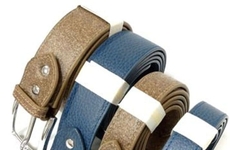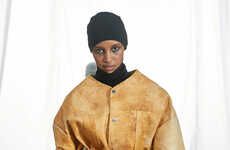
Deadwood's Vegan Capsule Collection is Made from Cactus Leather
Elena Rahman — May 19, 2021 — Eco
References: deadwoodstudios & wwd
Founded in 2012 by vintage-lovers Carl Ollson and Felix von Bahder, this Stockholm-based fashion label debuts its vegan capsule collection. Made entirely from cactus leather textile, Deadwood's sustainable new launch is handmade.
Deadwood's plastic-free, plant-based vegan leather was inspired by two cactus farmers in Guadalajara, who began experimenting with the textile to make leather. The company approached the farmers to better understand the technology to be implemented in its capsule apparel collection. The cacti used for collection is organically grown.
Featuring the brand's bestselling men's and women's moto jackets and women's trousers, the collection is available in several vibrant colors. Ranging from green, red, beige, and black, and in men's XS to XL sizes and women's 34 to 42, the capsule is available on the brand's e-commerce, Net-a-porter, Printemps, and Zalando.
Image Credit: WWD
Deadwood's plastic-free, plant-based vegan leather was inspired by two cactus farmers in Guadalajara, who began experimenting with the textile to make leather. The company approached the farmers to better understand the technology to be implemented in its capsule apparel collection. The cacti used for collection is organically grown.
Featuring the brand's bestselling men's and women's moto jackets and women's trousers, the collection is available in several vibrant colors. Ranging from green, red, beige, and black, and in men's XS to XL sizes and women's 34 to 42, the capsule is available on the brand's e-commerce, Net-a-porter, Printemps, and Zalando.
Image Credit: WWD
Trend Themes
1. Plant-based Leather - The rise of plant-based leather products creates opportunities for sustainable and eco-friendly apparel manufacturing.
2. Vegan Fashion - The increasing demand for vegan apparel results in a new market niche for fashion businesses to target.
3. Organic Textiles - The move towards using organic materials in clothing production creates opportunities for innovative textile development.
Industry Implications
1. Fashion - The fashion industry can capitalize on the trend towards sustainable materials to create eco-friendly and innovative apparel lines.
2. Ecological Sustainability - The trend towards ecological sustainability and eco-friendly production presents opportunities for businesses seeking to align with sustainable values.
3. Textile Manufacturing - The rise of plant-based, organic, and vegan textiles demands a shift in conventional textile manufacturing practices which can lead to innovative developments.
4.2
Score
Popularity
Activity
Freshness























